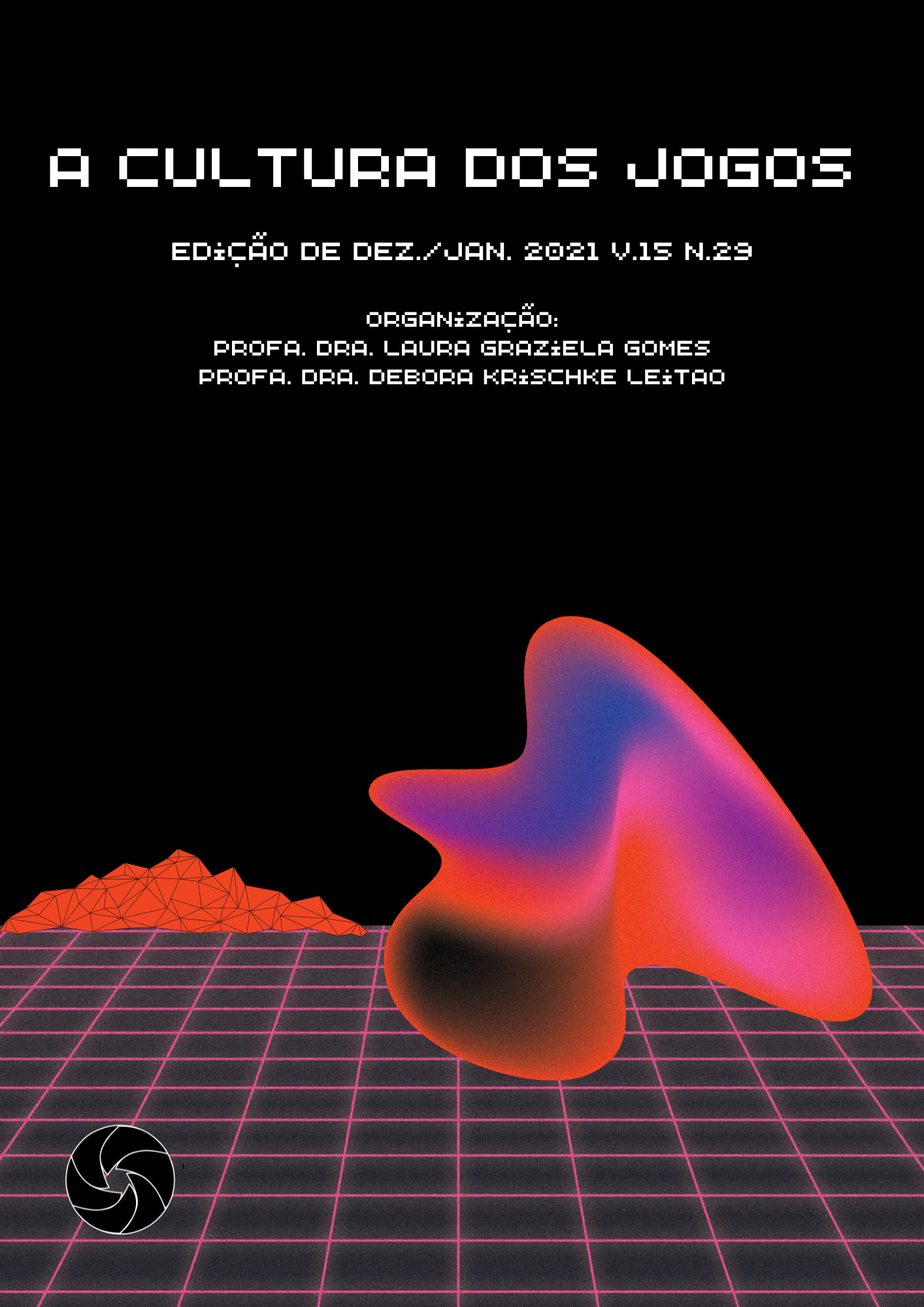Death By Cuteness - Queer-Affective Ethics and Cuteness Aesthetics
DOI:
https://doi.org/10.5433/2237-9126.2021v16n29p80Keywords:
Digital Games, Queer Games, Sexuality, GenderAbstract
This paper deals with the observation of a Workshop realized within the San Francisco Bay queer avant garde video game scene, an academic and game development queer scene in North America. The queer video game scenes are known for its appropriation of video game dynamics (such as narrative and mechanics) as well as other pop culture related aesthetics and LGBTQ related identities and historical elements. These productions aim to produce new ways of narrating non-heterosexual and non-cissexual experiences, and to resist the hegemonic comprehension that exclude them from the culture. Being so, the aesthetic relations organized by this scene will be analyzed, especially the cuteness aesthetic, and how this is understood and used for a symbolic and affective differential access in these communities, as well as a resistance to mainstream digital aesthetic.Downloads
References
CONDIS, Megan. No homosexuals in Star Wars? BioWare,'gamer'identity, and the politics of privilege in a convergence culture. Convergence, v. 21, n. 2, p. 198-212, 2015.
DECATUR, Mary-Anne. Consuming Cuteness in Japan: Hello Kitty, Individualism and Identity. Popular Anthropology Magazine, v. 3, n. 1, 2012b.
DONOVAN, Tristan. Replay: The history of video games. Yellow Ant, 2010.
FANTONE, Laura. Video Games and Queerness in California. Digital Creativity, v. 25, n. 4, 2014, p. 357-359.
FRON, Janine; FULLERTOM, Tracy; MORIE, Jacquelyin Ford; PEARCE, Celia. The hegemony of play.In: Situated Play: Proceedings of Digital Games Research Association 2007 Conference. Tokyo, Japan. 2007, p.1-10.
GOETZ, Christopher. Coin of another realm: Gaming's queer economy. Game Studies, v. 18, n. 3, 2018.
GOETZ, Christopher. Building Queer Community. First Person Scholar, 2015. Disponível em: http://www.firstpersonscholar.com/building-queer-community/. Acesso em: jun/ 2017.
GOULART, Lucas Aguiar; NARDI, Henrique Caetano. O Circuito da Diversão ou Da Ludologia à Ideologia: Diversão, Escapismo e Exclusão na Cultura de Jogo Digital. Logos, v. 26, n. 2, 2019, p. 72-85.
HARRIS, Daniel. Cute, Quaint, Hungry, and Romantic: The Aesthetics of Consumerism. New York: Basic Books, 2000.
KINSELLA, Sharon. Cuties in japan. Women, media and consumption in Japan, 1995, p. 220-254.
KLINE, Stephen; DYER-WITHEFORD, Nick; DE PEUTER, Greig. Digital play: The interaction of technology, culture, and marketing. Montreal, McGill-Queen's Press-MQUP, 2003.
MUÑOZ, José Esteban. Disidentifications: Queers of color and the performance of politics. Unniversity of Minnesota Press, 1999.
MUÑOZ, José Estevan. Ephemera as evidence: Introductory notes to queer acts. Women & Performance: a journal of feminist theory, v. 8, n.2, 1996, p. 5 -16.
NGAI, Sianne. Our aesthetic categories: Zany, cute, interesting. Harvard Press 2012.
NGAI, Sianne. Ugly feelings. Harvard University Press, 2005.
POZO, Diana; RUBERG, Bonnie; GOETZ, Chris. Practice Queerness and Games. In: Camera Obscura: Feminism, Culture, and Media Studies, v. 32, n. 2 (95), 2017, p. 153-163.
POZO, Teddy. Queer games after empathy: Feminism and haptic game design aesthetics from consent to cuteness to the radically soft. Game Studies, v. 18, n. 3, 2018.
RUBERG, Bonnie. Queering indie. In: RUFFINO, Paolo. Independent Videogames: Cultures, Networks, Techniques And Politics, Routledge, 2020a.
RUBERG, Bonnie. The queer games avant-garde: How LGBTQ game makers are reimagining the medium of video games. Duke University Press, 2020b.
RUBERG, Bonnie. The Queerness and Games Conference. In: PAYNE, Matthew Thomas; HUNTEMANN, Nina. How to Play Video Games. NYU Press, 2019.
SEDGWICK, Eve Kosofsky. Touching feeling: Affect, pedagogy, performativity. Duke University Press, 2003.
SHAW, Adrienne. Do you identify as a gamer? Gender, race, sexuality, and gamer identity. New media & Society, v. 14, n. 1, 2012, p. 28-44.
SHAW, Adrienne. Gaming at The Edge: Sexuality and Gender at the Margins of Videogame Culture. Minneapolis: University of Minnesota Press, 2014.
SHAW, Adrienne. What is video game culture? Cultural studies and game studies. Games and culture, v. 5, n. 4, 2010, p. 403-424.
SHAW, Adrienne. Rethinking game studies: A case study approach to video game play and identification. Critical studies in media communication, v. 30, n. 5, p. 347-361, 2013.
SICART, Miguel. Values between systems: Designing ethical gameplay. In: Ethics and Game Design: Teaching Values through Play. New York, Information Science Reference, 2010, p. 1-15.
STOCKTON, Kathryn Bond. The queer child, or growing sideways in the twentieth century. Duke University Press, 2009.
Imagens:
ANTHROPY, Anna. Gay Cats Go To The Weird Weird Woods; 2015
EPIC GAMES. Gears of War 3. 2011
EMPTY FORTRESS. A Russian Valentine. 2013
KOPAS, Merritt. Hugpunx, 2013
NAMCO. Pac Man, 1980
NOON, CEREY E VULVASAUR, 2014. Ultimate Star Collector: Winner of the Universe, 2014
Downloads
Published
How to Cite
Issue
Section
License
Copyright (c) 2022 Domínios da ImagemDomínios da Imagem adopts the Creative Commons Attribution 4.0 International License, therefore, the copyrights related to the published articles belong to the author(s), who grant the journal the exclusive right of first publication.
Under this license it is possible to: Share - copy and redistribute the material in any medium or format. Adapt - remix, transform, and build upon the material, giving due credit and providing a link to the license and indicating if changes were made.












 The works in this journal are licensed under Creative Commons .
The works in this journal are licensed under Creative Commons .